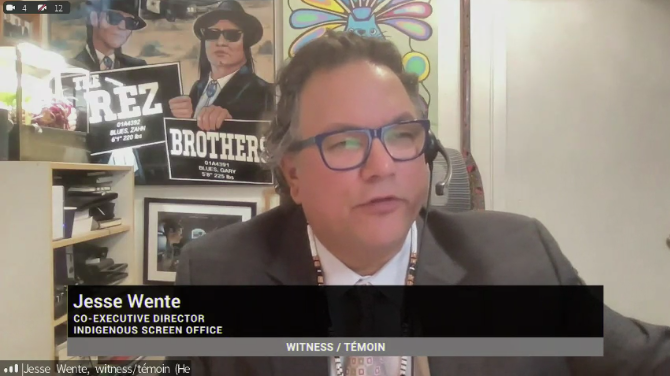Jesse Wente proposes amendments to bring C-11 in line with UNDRIP
Broadcast | 11/15/2022 5:30 pm EST
Indigenous broadcasting stakeholders proposed amendments to the Online Streaming Act Tuesday, as the Senate Committee on Transportation and Communications continued its study of Bill C-11, that would bring the legislation in line with Canada’s commitment to United Nations Declaration on the Rights of Indigenous Peoples (UNDRIP).
“The previous [Broadcasting Act] in ’91 barely mentioned us. It’d be nice to see this bill go very far in terms of being specific about what it is looking to achieve,” Co-executive director of the Indigenous Screen Office Jesse Wente told Senators.
Canada’s last Indigenous broadcasting policy was formulated in 1990, which predates the Broadcasting Act. Last year Canada officially aligned itself with the UNDRIP and committed to implementing UNDRIP in its legislation moving forward. For the broadcasting sector that would mean addressing UNDRIP’s articles to increase Indigenous-owned media to promote its language and culture.
Wente said it “would be valuable” for C-11 to include in its summary a statement that the legislation recognizes the government’s commitment to adhere to UNDRIP and to recognizes that Indigenous storytelling “encompasses things that might constitute journalism and that there is some blurring of the lines in terms of how” Indigenous broadcasters approach those definitions around storytelling.
Wente also said Indigenous peoples in the legislation must be defined to reflect that it encompasses Indigenous, Metis, First Nations, and Inuit peoples and that Indigenous news outlets are defined as “being controlled and operated by Indigenous people.”
Wente also proposed amending Section 11.1 of the bill, which deals with the commission’s ability to make regulations respecting expenditures, to include “a separate call out line that says they should involve a significant portion of Indigenous news outlets and meaningfully support the stability of those outlets.”
Finally, Wente proposed amending Section 33 of the bill, which stipulates qualifications for arbiters, to include that Indigenous people must be present on any roster of arbiters.
Wente said the largest barrier for Indigenous broadcasters and creators has been a such a long history of rejection, “that our communities have sought refuge elsewhere,” he said.
Wente told senators he is also concerned around Section 4.2 of the bill, the hotly-debated “exception to the exception” which the Liberals said would bring social media platforms in but keep users out, but which opponents of the bill fear would regulate everyday Canadian content creators.
“The concern is, you know, Indigenous people who have been locked out of the traditional broadcast sector in Canada have found new audiences and new business models in these emerging technologies. And some of them do make money and do have careers based off them. I’m not sure those sorts of content creators should be treated in the same way as a large multinational corporation, or a large broadcast entity like a cable channel or a broadcast network. And so I would just be cautious around any of that,” he said.
– Reporting by Jenna Cocullo at jcocullo@thewirereport.ca and editing by Michael Lee-Murphy at mleemurphy@thewirereport.ca

